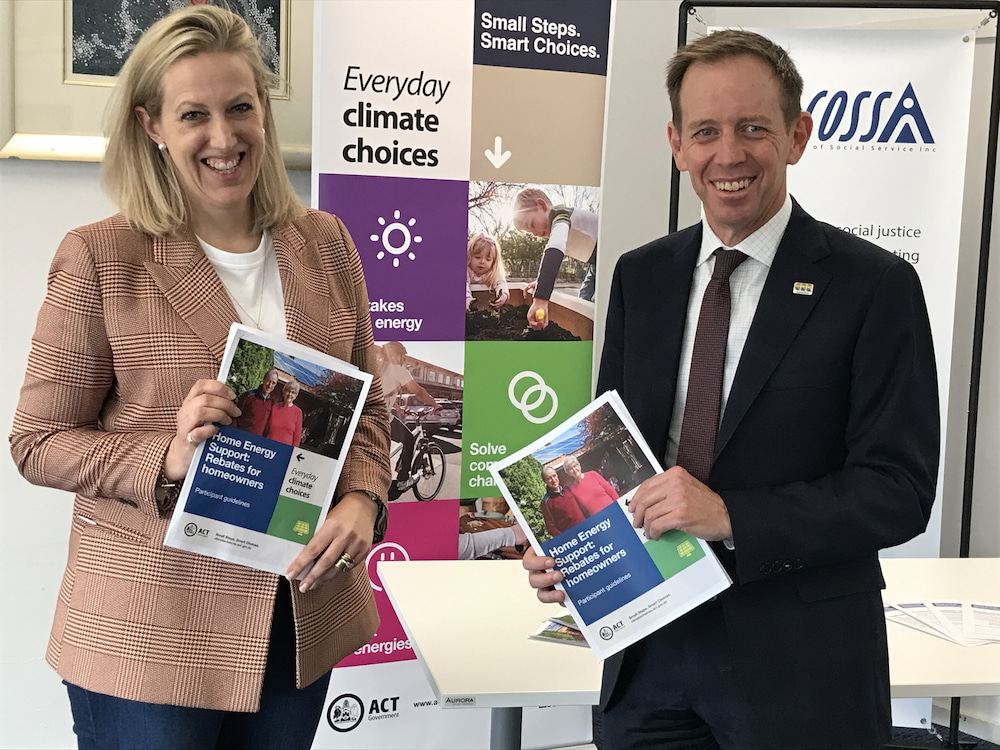Canberrans on low incomes can now install rooftop solar power for zero dollars up front, and save up to $1,000 a year, thanks to the ACT Government’s Home Energy Support Program.
“This is a really important way to help some of our most vulnerable households in the city,” said Shane Rattenbury, ACT Minister for Water, Energy and Emissions Reduction.
“People on low incomes in the ACT really struggle to keep a roof over their head, put food on the table, and cover the cost of basics like medical bills and transport,” said Dr Emma Campbell, CEO of the ACT Council of Social Service (ACTCOSS).
“Every dollar counts if you are a low-income household. So significant savings on your energy bills will make a huge difference to your daily budget, and enable you to keep you and your family safer and healthier by keeping warm in winter and cool in summer.”
The ACT Government has invested $50 million in the Home Energy Support Program over four years to improve building efficiency and sustainability for social and public housing, low-income owner occupiers and low performing rental properties.
In the first, $3.1 million stage, low-income homeowners, pensioners, and veterans with Gold Cards can get a $2,500 rebate on a solar system, Mr Rattenbury explained.
A 5.5 to 6.5 kW system – recommended for most households – costs up to $7,000. The rebate, Mr Rattenbury said, “makes a real dent in that”.
They can then either pay extra to get the full cost of the system, or borrow an interest-free loan from the Sustainable Household Scheme, repaid over four years.
The government offers a free seminar on rooftop solar systems: how they operate, their size, what customers should look for.
“We provide not only the financial support but also the awareness and information that helps people feel more confident in making a call to the accredited providers,” Mr Rattenbury said.
By mid-year, the program will cover heating and cooling systems, insulation, and hot water heat pumps, which reduce household energy bills and make homes more comfortable, Mr Rattenbury said.
Participants in the scheme will be eligible for both if they want; they can apply first for the solar scheme and then for a hot water system.
The program is designed to look after low-income households as the ACT transitions to clean energy, Mr Rattenbury explained. It builds on the Solar for Low Income program, which gave households a $2,500 rebate; that scheme helped more than 670 poor households save more than a thousand dollars on their energy bill every year.
“These are really serious cost of living savings for households,” Mr Rattenbury said. “These households spend a greater portion of their income on energy bills, and they feel it more if there is an increase in energy prices.
“This is not a one-off $250 payment” – a reference to the measures in this week’s budget to ease the cost of living. “This is year after year of savings on energy bills that can make a real difference for those who struggle most with their energy bills.”
Dr Campbell looked forward to when the program will be extended to social housing and private renters, as well as to community sector organisations that provide services to the most vulnerable members of the community.
“Ensuring all Canberrans have access to safe, cheap, affordable utilities, including energy, is a key part of social justice,” she said.
ACTCOSS will advocate for tougher emergency efficiency measures in the next round of the scheme, from double glazing to better curtains and other types of insulation.
Another free government program gives renters energy efficiency advice on how to upgrade their property cheaply, quickly, and easily, so they can cut their power bills.
In the coming months, the government will require landlords to upgrade rental properties to minimum performance standards so that tenants are more comfortable and their homes are cheaper to run, Mr Rattenbury said. He expects costs will be passed onto landlords rather than to renters, but is finalising the details of the model.
Over the last decade, Dr Campbell said, Mr Rattenbury’s work in introducing energy efficiency standards for ACT rental properties was “nation-leading”.
With the Federal election soon, Dr Campbell urged all ACT candidates to ensure the Federal government helped low-income households to make their homes more energy efficient and to invest in better solar insulation, “so that all homes can be healthy and safe as we face this challenging climate crisis”.
“People on low incomes are most impacted by climate change,” she said. “They can’t afford to escape the smoke and bushfires; their homes are poorly insulated; and many of them really struggle to keep their homes warm in winter and cool in summer because of the challenges we’re seeing through our climate emergency.
“It’s shockingly evident now in northeast NSW and south-east Queensland. And so, without fair, fast action on climate change, we’re going to see these situations worsen.”



